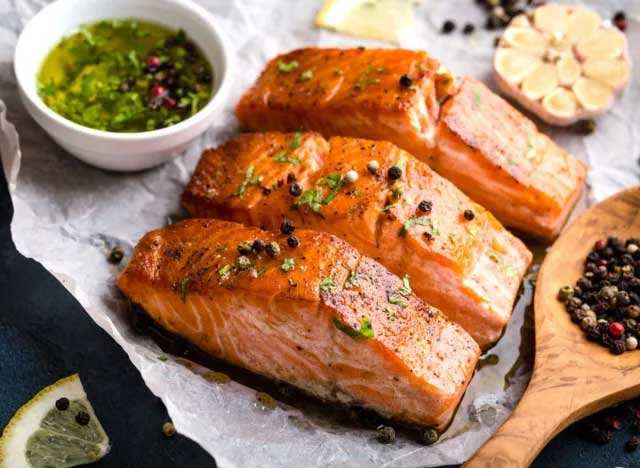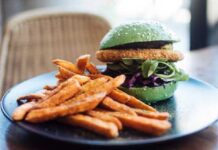
All the reasons why it’s best to consume this fat in moderation.
Canola oil, is it friend or foe? Regardless of what you may have heard from social media influencers, this Canadian-born oil isn’t necessarily a dietary supervillain. Claims of its serious health detriments (like causing heart disease, triggering insulin resistance, and escalating inflammation) are largely fueled by research conducted on animals, not humans. In fact, according to the Mayo Clinic, the Harvard T.H. Chan School of Public Health, and the American Heart Association, canola oil is not only safe to use, but has also been categorized as “better for you” due to its low saturated fat content.
That said, canola oil isn’t a perfect pantry staple. Like any highly-processed food, it’s got some downsides worth discussing. Here are five reasons why it’s best to consume this fat in moderation. And don’t miss our definitive ranking of the best oils to cook with!
It Can Turn Rancid Faster Than You Think

Canola oil begins its life in the seeds of rapeseed plants. To get the oil out of the tiny seeds, manufacturers use heat and a solvent called hexane. Despite its chemical-sounding name, hexane itself isn’t dangerous. Instead, the application of heat and hexane can affect canola oil molecules’ stability, causing the oil to quickly turn rancid—and even destroying healthy omega-3 fatty acids.
To get the most shelf life out of your bottle, keep it in a cool, dark place—not near the stovetop! And be watchful for signs that your oil has turned. An “off” odor, color changes, or visible mold are all good reasons to toss it.
You Could Overdo It On Omega-6 Fatty Acids

You’re likely familiar with the benefits of the darling of the fat universe, omega-3s. But you might have heard some shade thrown at their neighbor down the chemical chain, omega-6 fatty acids. Canola oil contains both omega-3s and omega-6s in a 2:1 ratio.
Believe it or not, omega-6s perform plenty of helpful functions in the body, like maintaining bone health and stimulating hair growth. But getting too many of them, especially in an excessive ratio of 6’s to 3’s, can spell trouble for health.
Some research has linked an unbalanced mix of the two fats to issues like autoimmune disease, cancer, and cardiovascular disease. Canola oil’s 2:1 ratio isn’t terrible (estimates for the ideal range from 4:1 to 1:1), but if added to a Western diet or diet already heavy in omega-6’s, it may lead to complications.
You Might Increase Risk For Chronic Disease

To go from plant to bottle, canola oil goes through a complicated series of steps including seed cleaning, conditioning, cooking, pressing, extracting, and desolventizing, to name a new. Holy canol-y, that’s a lot of processing! However, almost all seed oils undergo a similar process, so we can’t point the finger at canola alone.
As you’re likely aware, eating lots of processed foods can be bad news for health. Research shows that diets high in so-called “ultra-processed” foods—those that go through multiple steps of physical, biological, and/or chemical change—can lead to a higher incidence of issues like cancer and heart disease. Canola oil all by itself won’t cause these diseases but may be problematic as part of a big-picture processed diet.
You Won’t Rack Up Many Nutrients

Canola oil adds richness to salad dressings and helps veggies crisp up during cooking, but it doesn’t have much to offer in terms of nutrients. All of its calories (about 120 per tablespoon) come from fat. And whereas some oils, like olive and avocado, boast a variety of micronutrients and antioxidants, canola oil contains appreciable amounts of just two: vitamin E and vitamin K.
On the other hand, there is a silver lining: the body needs a source of fat to absorb vitamins E and K, so canola oil is a built-in vehicle for the very nutrients it contains.
You Might Be Using It To Make Less-Than-Healthy Foods

The side effects of cooking with canola might be more about what you’re cooking it with. Because of its high smoke point, canola often serves as the base for deep-fried foods like battered meats, hush puppies, and French fries. Baked goods are another popular medium for canola’s smoothness and mild flavor. Tasty as these dishes are, they’re not always the healthiest choices. If you reach for canola only to bake and fry, you could be unintentionally derailing your health goals.
Important Notice: This article was originally published at www.eatthis.com by Sarah Garone, NDTR where all credits are due. Fact checked by Samantha Boesch.
Disclaimer
The watching, interacting, and participation of any kind with anything on this page does not constitute or initiate a doctor-patient relationship with Dr. Farrah™. None of the statements here have been evaluated by the Food and Drug Administration (FDA). The products of Dr. Farrah™ are not intended to diagnose, treat, cure, or prevent any disease. The information being provided should only be considered for education and entertainment purposes only. If you feel that anything you see or hear may be of value to you on this page or on any other medium of any kind associated with, showing, or quoting anything relating to Dr. Farrah™ in any way at any time, you are encouraged to and agree to consult with a licensed healthcare professional in your area to discuss it. If you feel that you’re having a healthcare emergency, seek medical attention immediately. The views expressed here are simply either the views and opinions of Dr. Farrah™ or others appearing and are protected under the first amendment.
Dr. Farrah™ is a highly experienced Licensed Medical Doctor certified in evidence-based clinical nutrition, not some enthusiast, formulator, or medium promoting the wild and unrestrained use of nutrition products for health issues without clinical experience and scientific evidence of therapeutic benefit. Dr. Farrah™ has personally and keenly studied everything she recommends, and more importantly, she’s closely observed the reactions and results in a clinical setting countless times over the course of her career involving the treatment of over 150,000 patients.
Dr. Farrah™ promotes evidence-based natural approaches to health, which means integrating her individual scientific and clinical expertise with the best available external clinical evidence from systematic research. By individual clinical expertise, I refer to the proficiency and judgment that individual clinicians acquire through clinical experience and clinical practice.
Dr. Farrah™ does not make any representation or warranties with respect to the accuracy, applicability, fitness, or completeness of any multimedia content provided. Dr. Farrah™ does not warrant the performance, effectiveness, or applicability of any sites listed, linked, or referenced to, in, or by any multimedia content.
To be clear, the multimedia content is not intended to be a substitute for professional medical advice, diagnosis, or treatment. Always seek the advice of your physician or other qualified health providers with any questions you may have regarding a medical condition. Never disregard professional medical advice or delay in seeking it because of something you have read or seen in any website, video, image, or media of any kind. Dr. Farrah™ hereby disclaims any and all liability to any party for any direct, indirect, implied, punitive, special, incidental, or other consequential damages arising directly or indirectly from any use of the content, which is provided as is, and without warranties.








